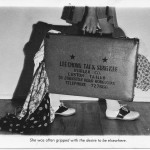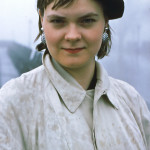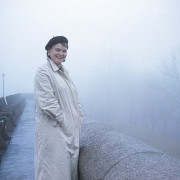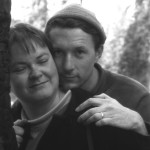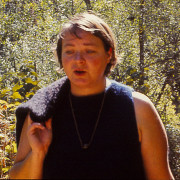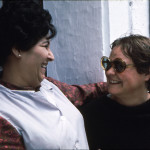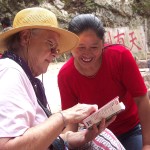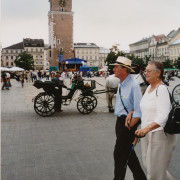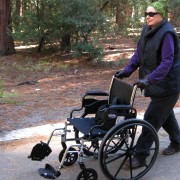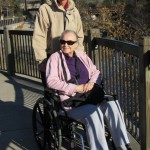
Some of her books
Spiritual
Amazing Grace, a Vocabulary of Faith, Kathleen Norris
When Things Fall Apart, Heart Advice for Difficult Times, Pema Chodron
The Pocket Pema Chödrön,
The Tibetan Book of Living and Dying,Sogyal Rinpoche
The I That is We, Awakening to Higher Energies Through Unconditional Love by Richard Moss, MD
Time, Space, and Knowledge, A New Vision of Reality by Tarthang Tulku
Interbeing, Commentaries on the Tiep Hien Precepts,Thich Nhat Hanh
Shambhala,The Sacred Path of the Warrior, Chogyam Trungpa
A New Approach to Buddhism, Dhiravamsa
The Exploits of the Incomparable Nasrudin, Idries Shah
Tales of the Dalai Lama, Pierre Delattre
Poetry
Seamus Heaney, Selected Poems 1966 – 1987
The Haw Lantern, Seamus Heaney
Picnic, Lighting – U.S. Poet Laureate Billy Collins
Collected Poems of Randall Jarrell
A Thousand Mornings, Poems, Mary Oliver
Dog Songs, Mary Oliver
Essays on nature and place
Irish Hunger, Personal Reflection on the Legacy of the Famine, Tom Hayden
The Faraway Nearby, Rebecca Solnit
Dakota, A Spiritual Geography, Kathleen Norris
Land of the Burnt Thigh. The Lively Story of Women Homesteaders On The South Dakota Frontier, Edith Eudora Kohl
Where I Was From, Joan Didion
The Pillow-Book of Sei Shonagon, Arthur Waley
Fiction
Bel Canto, Ann Patchett
The Woman Lit by Fireflies, Jim Harrison
The Bear Went Over the Mountain, William Kotzwinkle (We read this to each other twice and had to pause often to catch breath from our laughing. )
Marcolvaldo by Italo Calvino. (Another one that we read aloud.)
Animal Dreams, Pigs in Heaven, and Prodigal Summer — novels by Barbara Kingsolver
The Bat Poet by Randall Jarrell
Mystery authors
P. D. James, Nevada Barr, Ruth Rendell, Tony Harman
Her music
Me Voy al Pueblo, Trio los Panchos (she sang this song to me on our first date)
Speak Low, from Kurt Weill’s One Touch of Venus (Jerri Southern)
Fred Neil, Searching for the Dolphin and That’s the bag I’m in
Bruce Springsteen: Further on up the road, from Springsteen in Dublin concert
Jane Sibery, Everything reminds me of my dog
KoKo Taylor, Wang Dang Doodle
Many songs by Nina Simone
Sound track to Fellini’s Juliet of the Spirits by Nino Rota
Debussy: La Mer
Ravel: Piano Trio
Mahler’s Das Knaben Wunderhorn and Symphonies 1, 2, 4, & 5
Yo Yo Ma’s Silk Road series of CDs.
Some favorite movies
Mr. Hutlot’s Holiday, by Jacques Tati (We saw it on our first date in 1955!)
Wings of Desire and Faraway So Close by Wim Wenders (We saw the angels as our inner witness consciousness and felt high for a week after each time we saw the two films.)
Amarcord by Federico Fellini
Popeye by Robert Altman
All of Me by Carl Reiner, with Steve Martin and Lili Tomlin
Delovely, biopic of Cole Porter
Big, with Tom Hanks
Some favorite tv shows
Soap, two families linked by a sister to create some of the funniest TV ever and running seven seasons. Billy Crystal’s premier
Touch, an austic child is tuned into the world as an interdependent web of humanity. A remarkable vision of who we are.
Homicide, life on the streets, Law & Order, CSI, and foreign cop shows
Judge Judy!
Masterpiece Theater and Mystery on PBS
PBS News, Charlie Rose, and Frontline
Some favorite poems
A Man Meets a Woman in the Street
by Randall Jarrell
Under the separated leaves of shade
Of the gingko, that old tree
That has existed essentially unchanged
Longer than any other living tree,
I walk behind a woman. Her hair’s coarse gold
Is spun from the sunlight that it rides upon.
Women were paid to knit from sweet champagne
Her second skin: it winds and unwinds, winds
Up her long legs, delectable haunches,
As she sways, in sunlight, up the gazing aisle.
The shade of the tree that is called maidenhair,
That is not positively known
To exist in a wild state, spots her fair or almost fair
Hair twisted in a French twist; tall or almost tall,
She walks through the air the rain has washed, a clear thing
Moving easily on its high heels, seeming to men
Miraculous . . . Since I can call her, as Swann couldn’t,
A woman who is my type, I follow with the warmth
Of familiarity, of novelty, this new
Example of the type,
Reminded of how Lorenz’s just-hatched goslings
Shook off the last remnants of the egg
And, looking at Lorenz, realized that Lorenz
Was their mother. Quacking, his little family
Followed him everywhere; and when they met a goose,
Their mother, they ran to him afraid.
Imprinted upon me
Is the shape I run to, the sweet strange
Breath-taking contours that breathe to me: “I am yours,
Be mine!”
Following this new
Body, somehow familiar, this young shape, somehow old,
For a moment I’m younger, the century is younger.
The living Strauss, his moustache just getting gray,
Is shouting to the players: “Louder!
Louder! I can still hear Madame Schumann-Heink—”
Or else, white, bald, the old man’s joyfully
Telling conductors they must play Elektra
Like A Midsummer Night’s Dream—like fairy music;
Proust, dying, is swallowing his iced beer
And changing in proof the death of Bergotte
According to his own experience; Garbo,
A commissar in Paris, is listening attentively
To the voice telling how McGillicuddy met McGillivray,
And McGillivray said to McGillicuddy—no, McGillicuddy
Said to McGillivray—that is, McGillivray . . . Garbo
Says seriously: “I vish dey’d never met.”
As I walk behind this woman I remember
That before I flew here—waked in the forest
At dawn, by the piece called Birds Beginning Day
That, each day, birds play to begin the day—
I wished as men wish: “May this day be different!”
The birds were wishing, as birds wish—over and over,
With a last firmness, intensity, reality—
“May this day be the same!”
Ah, turn to me
And look into my eyes, say: “I am yours,
Be mine!”
My wish will have come true. And yet
When your eyes meet my eyes, they’ll bring into
The weightlessness of my pure wish the weight
Of a human being: someone to help or hurt,
Someone to be good to me, to be good to,
Someone to cry when I am angry
That she doesn’t like Elektra, someone to start out on Proust with.
A wish, come true, is life. I have my life.
When you turn just slide your eyes across my eyes
And show in a look flickering across your face
As lightly as a leaf’s shade, a bird’s wing,
That there is no one in the world quite like me,
That if only . . . If only . . .
That will be enough.
But I’ve pretended long enough: I walk faster
And come close, touch with the tip of my finger
The nape of her neck, just where the gold
Hair stops, and the champagne-colored dress begins.
My finger touches her as the gingko’s shadow
Touches her.
Because, after all, it is my wife
In a new dress from Bergdorf’s, walking toward the park.
She cries out, we kiss each other, and walk arm in arm
Through the sunlight that’s much too good for New York,
The sunlight of our own house in the forest.
Still, though, the poor things need it . . . We’ve no need
To start out on Proust, to ask each other about Strauss.
We first helped each other, hurt each other, years ago.
After so many changes made and joys repeated,
Our first bewildered, transcending recognition
Is pure acceptance. We can’t tell our life
From our wish. Really I began the day
Not with a man’s wish: “May this day be different,”
But with the birds’ wish: “May this day
Be the same day, the day of my life.”
Taking Off Emily Dickinson’s Clothes
by Billy Collins
First, her tippet made of tulle,
easily lifted off her shoulders and laid
on the back of a wooden chair.
And her bonnet,
the bow undone with a light forward pull.
Then the long white dress, a more
complicated matter with mother-of-pearl
buttons down the back,
so tiny and numerous that it takes forever
before my hands can part the fabric,
like a swimmer’s dividing water,
and slip inside.
You will want to know
that she was standing
by an open window in an upstairs bedroom,
motionless, a little wide-eyed,
looking out at the orchard below,
the white dress puddled at her feet
on the wide-board, hardwood floor.
The complexity of women’s undergarments
in nineteenth-century America
is not to be waved off,
and I proceeded like a polar explorer
through clips, clasps, and moorings,
catches, straps, and whalebone stays,
sailing toward the iceberg of her nakedness.
Later, I wrote in a notebook
it was like riding a swan into the night,
but, of course, I cannot tell you everything –
the way she closed her eyes to the orchard,
how her hair tumbled free of its pins,
how there were sudden dashes
whenever we spoke.
What I can tell you is
it was terribly quiet in Amherst
that Sabbath afternoon,
nothing but a carriage passing the house,
a fly buzzing in a windowpane.
So I could plainly hear her inhale
when I undid the very top
hook-and-eye fastener of her corset
and I could hear her sigh when finally it was unloosed,
the way some readers sigh when they realize
that Hope has feathers,
that reason is a plank,
that life is a loaded gun
that looks right at you with a yellow eye.
 From there we traveled to the Andalusian cities of Ronda, Cordoba, Seville, and Granada. Life in Nerja was quiet and slow, despite the busloads of Germans, Brits, and Scandanavians descending on el Balcon de Europa regularly.
From there we traveled to the Andalusian cities of Ronda, Cordoba, Seville, and Granada. Life in Nerja was quiet and slow, despite the busloads of Germans, Brits, and Scandanavians descending on el Balcon de Europa regularly.

